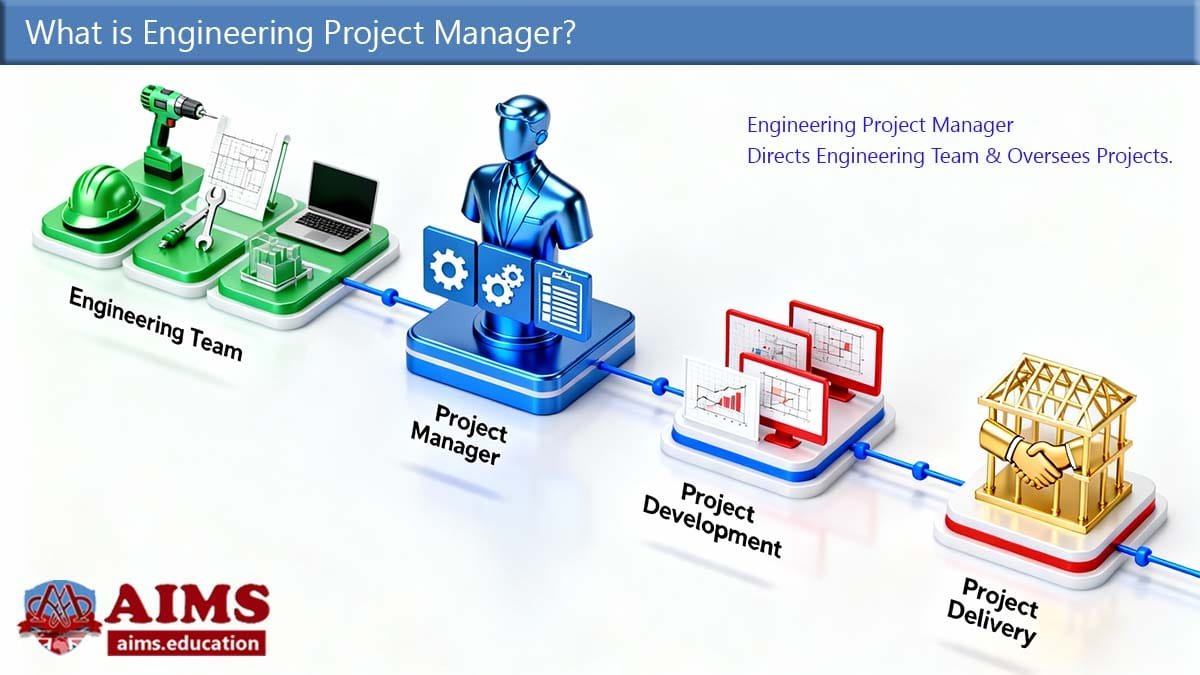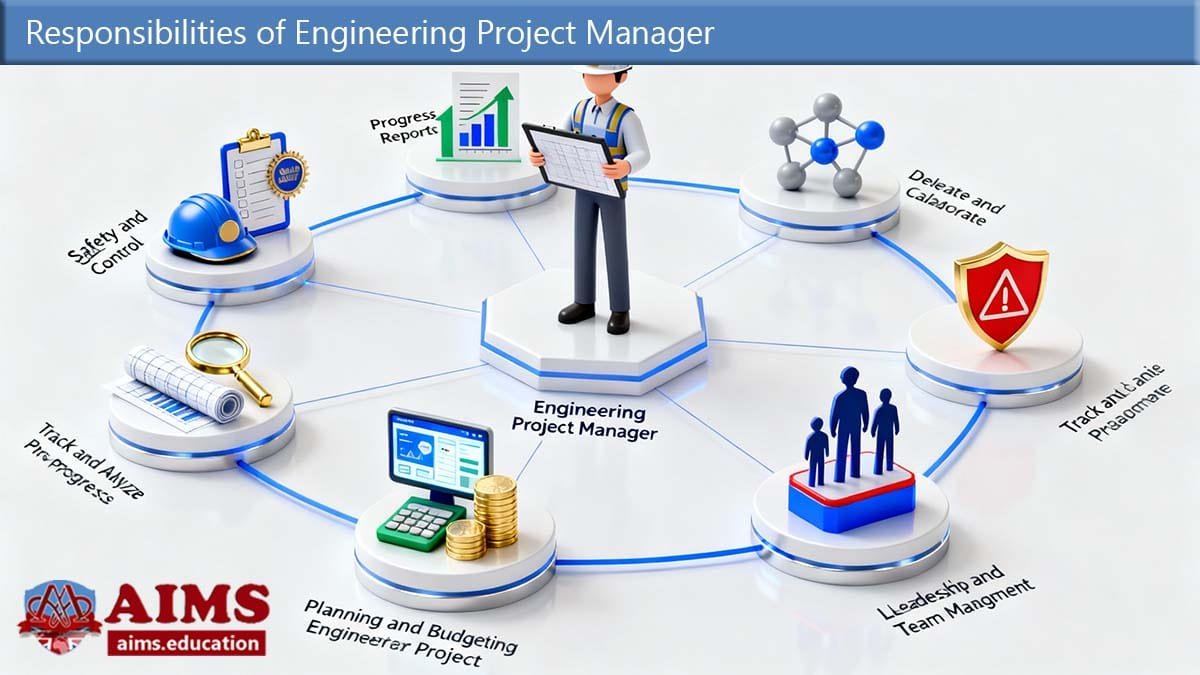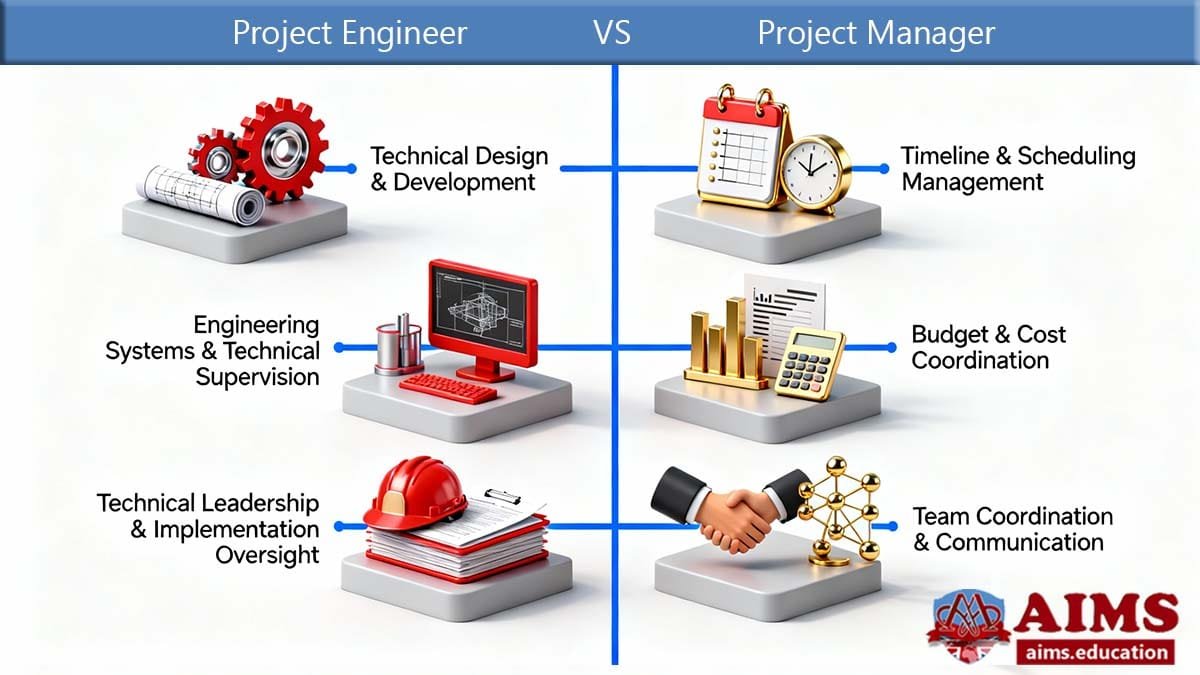What is an Engineering Project Manager?
An engineering project manager is a person who directs and evaluates the routine operations of an engineering team, and oversees the development of engineering projects from start to finish. The engineering project manager reviews the project process where manufacturers, designers, and engineers work together on a project. They assess proposals, ensure proper execution, and supervise technical specifications, budgeting, cost analysis, and project timelines to meet quality standards.
- They act as liaisons between stakeholders and engineering teams, convert complex projects into manageable tasks, arrange resources, manage project risks, and address quality control issues for successful engineering project management.
- Additionally, they play a significant role in driving innovation and improving process efficiency, ultimately aligning engineering solutions with strategic business goals.
Project Engineer VS Project Manager
Here are the key differences between Project Engineer and Project Manager:
- Project Engineer is a technical specialist responsible for the team’s technical performance, utilizing strong problem-solving and strategic skills. The person fosters an innovative and supportive environment to ensure continuous improvement and alignment with business objectives.
- On the other hand, the project manager role focuses on execution and completion of project tasks on time. The person optimize resource that are used, identify risks, and collaborate with stakeholders to mitigate these risks. Project manager also manage both internal and external dependencies critical for the project’s success.
Engineering Project Manager as a Career Path
Engineering Project Manager can join the esteemed and fulfilling career paths, offering opportunities to build infrastructure, systems, and products essential to today’s rapidly evolving world. The demand for engineering project managers is robust as the need for innovative engineering solutions continues to grow.
- Engineering Project Management career paths are diverse, with opportunities in sectors such as technology, construction, manufacturing, and energy.
- They often command competitive salaries and have considerable opportunities for career advancement.
- As engineering projects become increasingly complex, the demand for skilled engineering and technical managers grows.

Engineering Project Manager Salary Overview
The engineering project manager salary varies significantly depending, on their location, industry, company size, and years of experience. However, here is a typical salary overview:
- Entry-Level Engineering Project Manager: $65,000 – $85,000 per year
- Mid-Level Engineering Project Manager: $85,000 – $110,000 per year
- Senior Engineering Project Manager: $110,000 – $140,000+ per year
7 Key Responsibilities of an Engineering Project Manager
An engineering project manager has many responsibilities that must be fulfilled for the successful completion of a project:
1. Safety and Quality Control
They ensure that safety and quality standards meet national regulations. They review the quality control processes in project management to guarantee high standards for the final product.
2. Progress Reports
They write progress reports for projects at regular intervals—quarterly, semi-annually, or annually, depending on the project’s duration. These reports include details on targets, timelines, project KPIs, approved changes, budgets, and feedback from team members.
3. Delegate and Collaborate
Engineering project managers collaborate with a diverse team of professionals, exercising leadership, communication, and delegation skills.
4. Track and Analyze Project Progress
They track and analyze progress throughout the project lifecycle. Their responsibilities includes:
- Track and report key deliverables and milestones.
- Establish measurable objectives and KPIs.
- Conduct meetings with team members and stakeholders.
- Monitor progress against project timelines.
- Write regular evaluation and progress reports.
5. Planning and Budgeting Engineering Projects
They work with clients and their engineers to understand their needs and the project scope, developing a comprehensive project plan that outlines activities, timelines, and required resources. The project plan, timelines, and budget are important, critical and must be documented and updated on regular basis.
6. Leadership and Team Management
As an engineering project manager, you must be an effective leader, as team members, administrators, and other staff rely on your guidance.
- You must ensure that team members work efficiently to achieve project goals, even under pressure.
- You must also foster a supportive work environment, communicate effectively with workers in project, and monitor progress to ensure project objectives are met.
7. Risk Management
Most projects entail risks, such as financial or safety risks. As an engineering project manager, your role is to identify potential project related risks and quickly develop strategies to mitigate risks related to your engineering projects.

5 Key Skills of an Engineering Project Manager
Here are five critical project management skills of engineering managers required during engineering project management:
1. Communication Skills
You should have strong communication skills, capable of conveying information between team members and other managers in your project.
2. Organizational Skills
You should be able to schedule projects and manage data efficiently.
3. Problem-Solving Skills
You must make quick decisions when problems arise to avoid delays.
4. Mathematical Skills
Given the budgeting and project cost analysis tasks, engineering project managers must have strong mathematical and analytical skills.
5. Listening Skills
As an engineering project manager, good listening skills are essential for you to understand and respond effectively to the team’s input.
6 Career Paths for Engineering Project Managers
Engineering project management is a diverse field with several specialized areas, each requiring unique expertise. Engineering project managers’ diversity offers various career opportunities within the field. Below are some common career options for engineering project managers:
1. Construction Engineering Project Manager
They specialize in civil engineering principles, construction methods, and regulatory compliance. They oversee the construction of residential, commercial, and also large-scale infrastructure projects.
2. Software Engineering Project Manager
They oversee software development projects and typically hold degrees in computer science or software engineering. They are adept at navigating the complexities of software design, development, and deployment.
3. Manufacturing Engineering Project Manager
They specialize in designing, developing, and optimizing manufacturing processes. They lead efforts to improve efficiency, reduce costs, and enhance product quality within manufacturing facilities.
4. Aerospace Engineering Project Manager
They supervise projects in the aerospace sector and mainly focus on the design and production of spacecraft, aircraft, satellites, and related systems.
5. Environmental Engineering Project Manager
These project managers manage projects that improve environmental quality. They propose sustainable solutions and ensure compliance with the environmental regulations.
6. Energy Engineering Project Manager
Specializing in energy production and distribution, they focus on renewable energy projects, power plant construction, energy conservation, and related installations.
An engineering project manager plays a crucial role in project management, which is explored in detail through programs offered by the AIMS Institute of Project Management. These programs include certifications such as the Certified Project Management Expert, and the Online diploma in Project, Program, and Project Portfolio Management. Project managers without engineering degree must consider AIMS MBA Degree in Project Management online to develop both project and business management skills.

Methodologies for Engineering Project Managers
As an engineering project manager, you should be able to work on various project management methodologies, depending on the project’s needs and your ability to recognize the right methodology for a particular part of your project. Below are some popular methods used by engineering managers:
1. Waterfall Method
The Waterfall method is a linear and traditional project management approach where each task must be completed before the next begins. In engineering, this approach requires all documentation to be completed before the design phase starts and system testing before client testing. The final step is delivering the project to the client. You should use this method in projects that involve large teams, strict structural needs, and clearly defined outcomes.
2. Agile Method
The agile method for project management emphasizes incremental milestones rather than a rigid sequence of tasks. Unlike Waterfall, it does not require predefined outcomes and allows you to incorporate changes as the project progresses. It allows your clients to provide feedback throughout the project, making it favorable for projects where flexibility is key. However, as an engineering project manager, you should discuss the scope and boundaries of your project early to avoid scope creep. It is particularly suitable for clients looking to redesign a process or product over time.
Agile-Waterfall hybrid, the combination of above-mentioned methodologies is another valuable approach.
3. Scrum Method
The scrum project management method is ideal for complex engineering projects that require continuous communication and collaboration among team members. The engineering project manager assigns tasks and ensures that the team adheres to project timelines.
Frequently Asked Questions
Q1: What is an engineering project manager?
An engineering project manager plans, coordinates, and oversees projects end to end—aligning scope, budget, timelines, quality, resources, and risk.
Q2: How is a project engineer different from a project manager?
A project engineer focuses on technical execution; a project manager drives delivery, managing scope, schedule, budget, risks, and stakeholders.
Q3: What are typical salary ranges?
Entry: $65k–$85k; Mid: $85k–$110k; Senior: $110k–$140k+. Ranges vary by industry, location, company size, and experience.
Q4: What core responsibilities does the role include?
Safety and quality control, reporting, delegation and collaboration, tracking KPIs and milestones, planning and budgeting, leadership, and risk mitigation.
Q5: Which skills matter most?
Communication, organisation, problem-solving, maths/analytics, and active listening to support budgeting, scheduling, and technical decisions.
Q6: Which methodologies fit engineering projects?
Waterfall for linear, regulated work; Agile for iterative delivery; Scrum for collaboration and fast feedback. Hybrids combine stage-gates with sprints.
Q7: What career paths are available?
Construction, software, manufacturing, aerospace, environmental, and energy project management—each with unique standards and stakeholders.
Q8: How do managers track progress well?
Set objectives, KPIs, milestones; review regularly; compare plan vs actuals; document changes; and publish concise status reports.
Q9: What does good risk management involve?
Identify and assess risks early, plan mitigations, assign owners, monitor triggers, and keep the risk register current through delivery.
Q10: How can I become an engineering project manager?
Build technical foundations, gain delivery experience, add PM education and certifications, and develop leadership and stakeholder skills.
